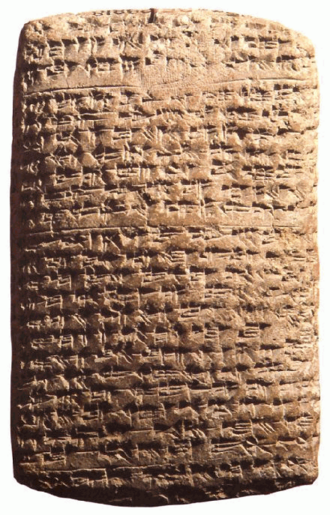The Amarna diplomatic letters exposed vassal relationships between field commanders, acting as local kings and Pharaoh their Egyptian ruler. Commanders of field garrisons, who defended Egyptian territories, sometimes expressed conflicting interests that often triggered a spate of letter writing. Victories, defeats or political turmoil weighed heavily on the writings.
The tablets appear to have been buried with Akhenaten at El Amarna, but they are not the originals, mostly made of clay from areas east of the Jordan River, they are deemed authentic copies. One such letter #254 titled "Neither Rebel nor Delinquent" by Labaya commander of the Samaria region, from Sakmu, the biblical city of Shechem exposed serious allegations against him for having surrendered land to the Habiru (see Deuteronomy 11:30 and Genesis 12:6). This and the related letters further south at Uru-Salem, biblical Jerusalem discuss battles waged by the Habiru.
 |
| Military correspondence from Canaan also known as Retenju |
Dating and sources of the Amarna letters are thought to span Egyptian Pharaoh's Amenhotep III, Akhenaten, through possibly Smenkhkare or Tutankhamun around 150 years. These Pharaoh's may have overlapped Biblical Hebrew or Israelite presence, enslavement in, exile from Egypt, early Canaanite wars and land resettlement. However, published chronologies have left much open to speculation, here we propose a resolution. The Labaya tablet #254 and others reference Pharaoh in his 32nd year of reign leaving only Amenhotep III who held power for 36-38 years during the Amarna period. According to the classic chronology Amenhotep III died in 1351 BCE.
The Bible describes Israel's 40 year sojourn, before it entered the land of Canaan and Joshua, the Israelite leader is said to have ruled 32 years after that. If there is a Biblical relationship to the Habiru, even if only some were Hebrew Israelite's raiding Canaan then letter #254 must have been written during the overlap of Amenhotep III and Joshua's 32 year reign, which according to the Biblical record ended in 1245 BCE. But, the 100 year gap between Amenhotep III and Joshua would need a resolution.
Prince Thutmose, the eldest son of Amenhotep III died in the third decade of his fathers reign. Stepping in, his younger brother Amenhotep IV (also known as Akhenaten) became the "strange" Pharaoh as depicted in uncharacteristically abstract art from his reign. From evidence at Amarna we know the mummified elite of Egypt had a poor state of health despite opposite representations reflected in artwork of the time. Amarna depicts how distance enabled diplomatic façade, appearance of control and power, yet reality was always different. For Akhenaten losing control of Retjenu (Canaan) may have been his diplomatic inheritance and artistic downfall.
From evidence toward the end of the 13th century BCE, Papyrus Anastasi III, Merneptah Stele (1203 BCE), Egyptian late bronze age temple at Jerusalem's École biblique and tombs north and north-west of Jerusalem's Mount Moriah we learn about a prolonged Egyptian commitment and interest in Canaan during the approximately 250 years of military activity from Amenhotep III to Merneptah. In addition to strategic and regional benefits, a long term commitment to Canaan may have been etched in the psyche of Egyptian leaders by Egypt's founder and first Pharaoh Khem. According to the Biblical record Khem (Biblical Ham) may have incestuously fathered Canaan. The place name Canaan is common in Egyptian and Biblical records.
This most tumultuous military period directly overlaps Israelite tribes who were displacing local Canaanite leaders and populations, long connected with Egypt, as they settled their indigenous land and entitlements east and west of the Jordan River. This re-settlement spanned a period of 300 years from Joshua until King David culminating the Israelite inheritance consistent with biblical teachings and tribal agreements.
In one letter, Adoni-Tzedek pleaded to convince Akhenaten to take the faster coastal route to rescue the dire situation in Jerusalem. And a letter, early in the reign of Akhenaten showed that the coast road was still open (pg278) when King Dusratta (Mitanni Empire) wrote to his son-in-law Akhenaten twenty years later, but no help appears to have been sent. If letter #254 describes the Biblical events that took place in 1273 BCE, at the beginning of Joshua's reign the Egyptian chronology, immediately prior to the Amarna period, would have to be revised forward by around ~100 years, which would be difficult for classical Egyptologists to digest. Joshua must then have overlapped Amenhotep III and Akhenaten, which if we wind back 40 years, would make Thutmose IV the prime candidate at the time of the Israelite Exodus led by Moses.
Even though the lower Galilee was, for some few years subdued, under Philistia and Syria it was reconquered by Rameses II, whose battle relief also mentions "Shalem" (Jerusalem), but historians reveal that neither he or his garrisons ever entered the Judæan mountains that were impassable for chariots, their supreme weapon of war. Seemingly, Jerusalem had been abandoned by Rameses II as well.
The events placed in these time frames may help us to better understand events that pre-dated Moses when "Pithom and Rameses", Egyptian cities built by Israelite slaves, may have underwritten the economic and political impetus that promoted the "House of Rameses" to compete for and obtain the status of Pharaoh over all of Egypt. However, by the time Rameses I and II became Pharaoh's it was already the latter half of Israel's 300 year resettlement of Canaan as recorded in The Book of Judges.
Often overlooked is the earliest recorded use of the Hebrew language by Ever (great-grandson of Noah) preceding Biblical Abraham, whose father, Terach and extended families continued to live in Haran, northern Syria. They were also likely referred to as Habiru, but their various lineages were not Israelite. Regardless, the Habiru referred in the Amarna letters are almost certainly those Israelites who arrived from Egypt to conquer and re-settle Canaan.


Nice work
ReplyDelete